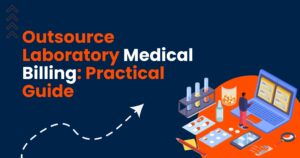In addition to identifying and treating the patients, medical outsourcing also handles the back-end procedures. By streamlining back-end processes, medical process outsourcing provides a solution that lets providers focus on core competencies and provide high-quality healthcare.
The primary function of healthcare outsourcing is patient treatment and diagnosis. They advance public health and save lives, but many operations happen in the background. Let’s discuss medical process outsourcing and its services. This sector offers a practical way for healthcare outsourcing providers to streamline back-end processes while concentrating on their primary business of providing high-quality health care. This article will discuss outsourcing medical and its importance and significance in healthcare outsourcing.
BPO has taken off and is now present in many different industries. Large companies set up shop in the Philippines for their call centres. IT companies outsource software development and information technology tasks to India, e-commerce companies outsource customer service, and banks assign billing and collection to BPO providers.
The healthcare sector is no different because clinical operations involve the sensitive nature of patient diagnosis and treatment. Healthcare institutions were initially unwilling to outsource these functions; on the other hand, the pandemic helped to foster the growth of healthcare outsourcing.
Administrative tasks and patient support services are examples of back-end tasks essential to healthcare operations. Some healthcare facilities seek assistance from medical outsourcing organizations because they lack the manpower, technology, and resources to complete these activities effectively.
Furthermore, healthcare institutions have recently outsourced clinical activities, including direct patient care, virtual medical care, and remote patient monitoring (RPM). To gain access to knowledge, resources, and technology, clinics, for instance, contract medical outsourcing services to handle their diagnostic work.
Benefits and Uses of Outsourcing in the Medical Industry
There are no indications that healthcare outsourcing will slow down or stop. The global outsourcing industry is expected to expand at a compound annual growth rate (CAGR) of 9.6% from $296.4 billion in 2026. Clinics, hospitals, insurance companies, and other healthcare institutions still use medical outsourcing services.
Here are a few benefits of medical process outsourcing:
Lower Expenses but Greater Earnings
One advantage of medical process outsourcing services in healthcare is cost reduction. It helps increase your bottom line in addition to cutting costs. Medical outsourcing solutions provide the following benefits, making them ideal for preserving cash flow.
Lower Cost for Medical Treatment
Using an overseas supplier can save operating and personnel costs. You don’t have to worry about developing infrastructure, purchasing medical software tools, or employing personnel with medical experience. In the long run, healthcare outsourcing can save you money.
Improved RCM or Revenue Cycle Management
A trustworthy medical process outsourcing company can manage your revenue cycle. It can monitor and evaluate the payments you get from patients for your healthcare services. The aim is to ensure your company makes more money than it spends.
Advanced Technology and Easily Achievable Talent
One of the main advantages of outsourcing medical services is the accessibility. For the following issues, clinics and hospitals with limited resources can report to medical process outsourcing services providers:
Addressing the lack of Workforce
This is probably why you may be required to contact medical outsourcing to handle several aspects of healthcare, such as processing claims and medical billings. You can hire a medical process outsourcing provider if you don’t have enough employees to tackle the non-core activities.
Making Use of Technology
You could require digital healthcare tools and communication technology for virtual healthcare and RPM. Automation and artificial intelligence (AI) may also be necessary to repeat healthcare operations, such as data entry and analysis. Medical outsourcing services are the solution for all these cases!
Enhanced Performance of Non-Clinical Activities
In the healthcare sector, outsourcing is the most advantageous for non-clinical work. Reputable BPO service providers aid in streamlining processes to increase production and overall efficiency. The healthcare tasks they perform are:
Coding and Billing for Medical Services
Outsourcing medical services representatives classify medical diagnoses and procedures using healthcare standard procedures coding system, current procedural terminology codes, and the international classification of diseases. They can produce super bills that are issued to patients and insurance companies.
Verification of Insurance and Processing of Claims
Agents of medical outsourcing solutions companies confirm medical coverage and insurance eligibility. They also evaluate and decide on claims filed by insurance holders or healthcare professionals.
Simplified Administrative Tasks
One of the main advantages of outsourcing for the healthcare sector is that clinical activities can be prioritized. Hospitals and clinics can concentrate on patient diagnosis and treatment while their contracted BPO partners handle administrative tasks. Think about the following:
Improved Services for Human Resources (HR)
You can use a third-party service provider for hiring, onboarding, and staff management. By doing this, your medical team can concentrate on treating patients and conducting exams.
Efficient Management of IT
IT administration is the most outsourced administrative task. You can assign skilled BPO providers to handle IT tasks, including network management, hardware and software upkeep, and troubleshooting. Thanks to outsourcing, healthcare functions remain uninterrupted.
Superior Medical Care and Increased Patient Contentment
Ultimately, providing high-quality care and satisfying patients are the main advantages of outsourcing in the healthcare sector. If you collaborate with a trustworthy BPO service provider, you may accomplish both goals. Here’s how to do it:
Enhancing the Quality of Patient Treatment
Doctors and other medical professionals can concentrate on patient care when they delegate administrative and non-clinical chores. When they are not concerned with medical bills, filing claims, providing IT assistance, or RCM, they can provide patients with superior healthcare services.
Guaranteeing the Contentment of the Patient
Doctors can deliver exceptional medical care by assigning non-clinical tasks to others and concentrating on clinical services. By doing this, you may be sure of patient happiness and loyalty. Your clinic will still provide medical care to patients, whether they need essential exams, diagnostic tests, or other treatments.
How to Get Past Challenges in Healthcare Outsourcing
The advantages of outsourcing in the healthcare sector are undeniable. Healthcare outsourcing enables hospitals and clinics to focus on providing high-quality healthcare while streamlining their back-end operations.
However, even if outsourcing healthcare has many positive aspects, there are also a few potential negative aspects. It’s critical to overcome typical BPO obstacles and lower any potential risks. Here’s how to do it:
Preserve Personal Health Information (PHI)
In 2022, the HIPAA Journal documented approximately 347 breaches of healthcare data, encompassing more than 500 records. Observe the Health Insurance Portability and Accountability Act of 1996 (HIPAA) to safeguard patient data when outsourcing. Ensure everyone is accountable and offer appropriate training to prevent data breaches.
Invest in Resources and Technology
Use robotic process automation (RPA), artificial intelligence (AI), and the cloud for non-clinical tasks like processing medical bills and claims. Use digital tools and communications technologies for clinical tasks like RPM, virtual healthcare, and direct patient care.
Create a Detailed Contract
The legally enforceable service-level agreement (SLA) fully covers your project terms. Provide a clear definition of the work scope and the key performance indicators (KPIs) your healthcare BPO supplier needs to meet. The SLA lowers the risk and lessens the difficulties associated with outsourcing.
Select the Best BPO for Healthcare Services
The key to a successful outsourcing project is selecting the correct partner. Think of a BPO company that employs a group of medical specialists. Take into account its resources, technology, outsourcing costs, and price.
Conclusion
Outsourcing has advantages in the healthcare sector, including better patient care and increased operational effectiveness. Outsourcing medical services has much to offer, including guaranteeing patient satisfaction and high-quality treatment, cutting expenses, and raising revenues. Find a reliable medical process outsourcing supplier if you want to profit from all these advantages. More importantly, use our helpful advice to overcome the above outsourcing obstacles. You can take advantage of the benefits of healthcare BPO by using these.





